 ...are three different things. But they're closely related to one another.
...are three different things. But they're closely related to one another.
I got to thinking about that after Sunday's message on Psalm 1, when I described what wisdom literature means in the Bible. There I said that the Bible's wisdom passages focus not so much on what's right, but rather on what's smart. Yet I don't want to imply (and hopefully no one inferred!) that wisdom literature is uninterested in truth or in morality (right & wrong). Actually, morality is based on truth, and wisdom in turn is based on morality.
Truth is simply what is: statements and ideas are true to the extent that they correspond with reality. As a simple example, the statement "there are two apples on the table" is true if in fact there are two apples there. If there is only one apple on the table, the statement is untrue. So when the Bible says things like God is one, the end result of sin is death, and salvation is attainable only through Jesus' atoning death on the cross, these are true statements because they describe the way things really are -- not just the way we imagine them to be. In this way, truth is the foundation of knowledge: it all starts with understanding things the way the really are. Once we do, we have a basis for...
Morality, which simply put is the difference between right and wrong. Morality comes from one's view of truth. For example, murder is not just illegal, it is immoral (in other words, it's wrong) because human life is sacred in reality. If I take an innocent person's life I haven't just done something violent and illegal, I've done something reprehensible and fundamentally wrong because I've acted as if I had a moral right to claim the victim's life. But in reality, I have no such right. In this way, reality itself determines what is right vs. what is wrong. So our view of truth determines what actions we will consider as being right. And putting the idea of truth together with the idea of morality leads us to...
Wisdom, which in the Bible basically means living successfully in the world. In other words, being smart rather than stupid. Wisdom basically means, because I understand the way the world works (truth), I'm able to see how I should and should not live (morality), and so I'm able to make daily choices that result in a happy, successful life (wisdom). It's that last phrase that the Bible's wisdom literature emphasizes: making smart choices that lead to long term success. This smart choice is always the right choice (morality) which is based on reality (truth).
Wisdom literature:
- doesn't talk much about truth or morality (but it assumes them both). Instead it focuses on the positive consequences of living in concert with truth & morality vs. the negative consequences of ignoring them,
- doesn't emphasize the rightness or wrongness of various lifestyle choices, but rather focuses on the results of making either choice,
- is written from the concrete perspective of living life, rather than the abstract perspective of describing truth,
- separates the "wise" (smart) person from the "foolish" (stupid) person.
True + Moral = Wise. Now that's an equation for success.































